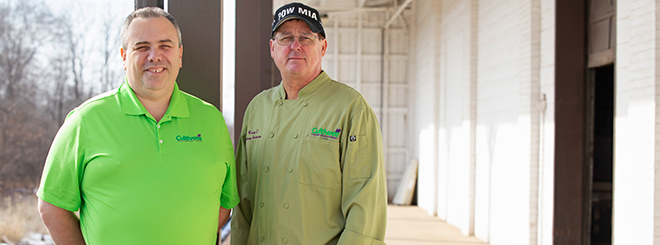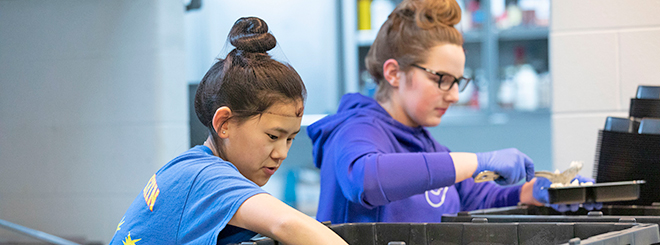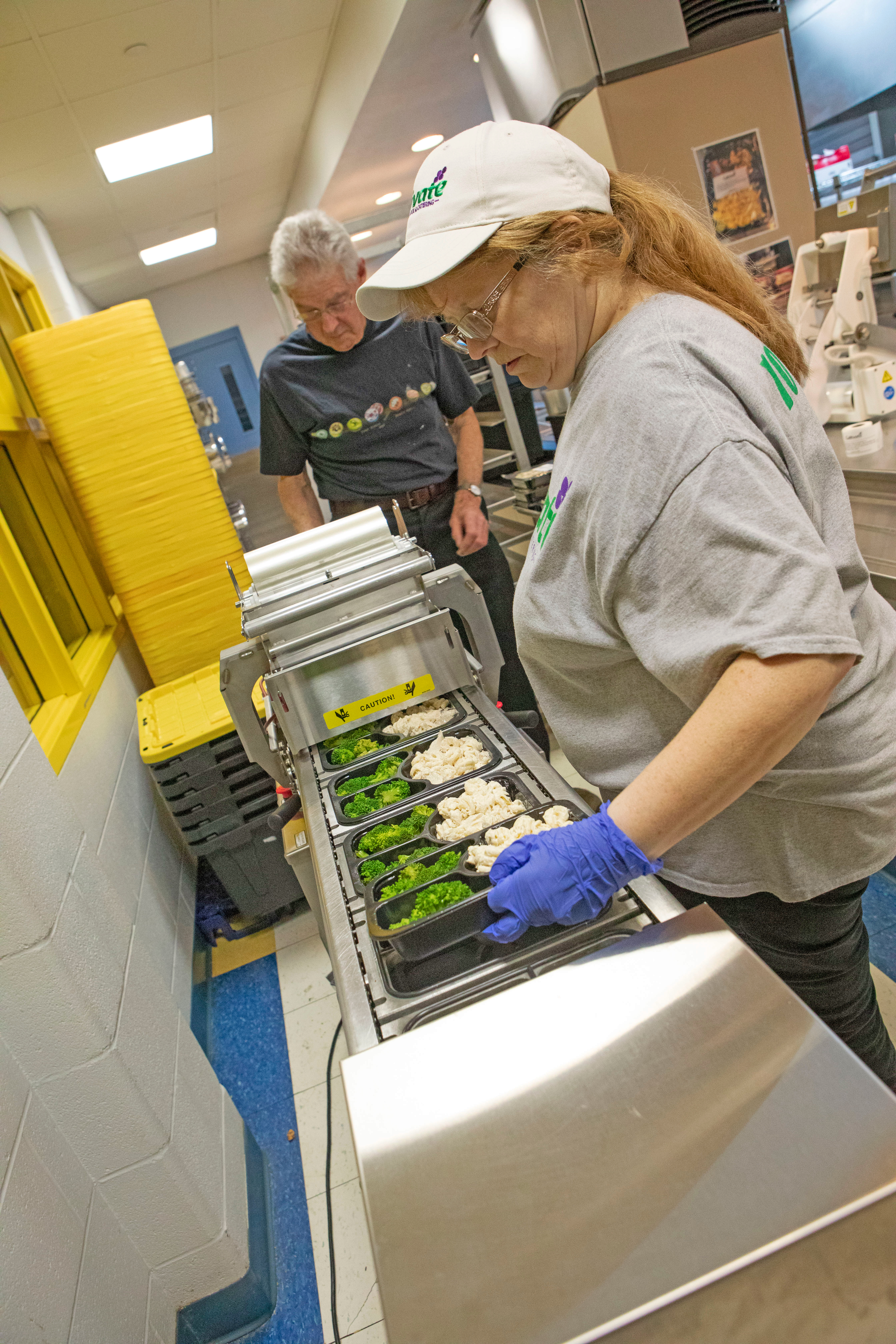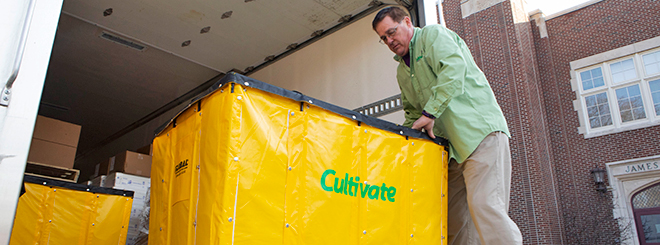Jim Conklin (left) and Randy Z are co-founders of Cultivate Culinary in South Bend, Indiana.
We know that a lot of food is wasted, but we also know that many people don’t have enough to eat.
Shouldn’t someone collect food destined to be thrown away and give it to people who need a decent meal?
That’s what Cultivate Culinary in South Bend, Indiana, is doing.
Since the nonprofit started in the summer of 2017, Cultivate has rescued more than 150,000 pounds of food and distributed more than 100,000 meals.
The meals go to more than 40 organizations in five counties (including the adjacent Elkhart County, where the Everence headquarters are located) that provide food to people in need.
The U.S. Department of Agriculture estimates that 30 to 40 percent of the food supply in this country is never eaten.
And 12 percent of U.S. households are considered food insecure – people in those homes aren’t sure they’ll be able to buy enough food to meet their needs.
Where does the food come from?
Cultivate collects food from many sources, including the University of Notre Dame and Nelson’s BBQ & Catering – the two largest contributors so far. Nelson’s, alone, cooks and serves more than 1 million halves of chicken per year.
Notre Dame borders South Bend, and Nelson’s headquarters are in Wakarusa, a few miles to the southeast. Those two sources have donated more than 90,000 pounds of food to Cultivate.
“We collect food that’s prepared but not served,” said longtime chef Randy Z, Cultivate’s co-founder and General Manager.

For example, when a company, school or nonprofit has a banquet, more food is prepared than served because the last thing the organizers want is to run out. Those extra pans of food the diners never see can be donated to Cultivate.
Food is picked up from Notre Dame regularly, but home football weekends are the real bonanza. Cultivate doesn’t collect concession items from Notre Dame Stadium, but food prepared for people who watch the games from corporate suites and private boxes, and from special events on campus for recruits, students and alumni.
What happens to the rescued food?
“All of the food we collect is labeled and dated,” said Jim Conklin, co-founder and Board President. The food is refrigerated in a “first-in, first-out” system. “Nothing stays in the refrigerator for long,” Conklin said.
The food is assembled to form meals with a protein, a starch and a vegetable, and those meals are frozen for distribution.
Conklin said, “Eight to 10 volunteers can make 300 to 650 meals in a two-hour timeframe.” The meals are ready to microwave.
Cultivate is piloting a backpack program for a local elementary school. Each backpack includes eight meals. The backpacks are provided to 100 students every Friday, to help feed the students and their families over the weekend.
How did this start?
Chef Randy Z operated a restaurant owned by a philanthropic family in Bremen, Indiana. When Jim Conklin was hired as Director of Finance for the Bremen family’s affairs, they decided to close the restaurant because of marginal financial performance.
The owner of the restaurant didn’t want to see Randy Z’s chef skills go untapped, and they decided he could teach culinary arts to students from The Crossing, a faith-based high school focused on youths who’ve struggled in more traditional schools. While running the culinary training program, Randy Z and Jim were introduced to the concept of food rescue.
A model in Indy
In the spring of 2017, Conklin and Randy Z visited Second Helpings in Indianapolis, which started a food rescue program in 1998.

Conklin said, “We went there to study their culinary program and were blown away by their food rescue operation – they rescued over 2 million pounds last year and serve 4,000 meals per day.”
Randy Z said, “It takes a lot to impress me,” but he couldn’t believe how efficiently the Second Helpings workers processed huge quantities of food.
Second Helpings handled an extraordinary volume of food at the time, because the Cultivate founders’ visit was on the Tuesday after the Indianapolis 500.
Randy Z said, “We saw that and said, ‘Wow – I wonder if this would work’” in the South Bend region.
Food rescue becomes a bigger emphasis
Conklin said, “We are driven by faith to help people in need in our community. It wasn’t a big jump for us to get involved” in food rescue. A generous donor provided seed capital, and Conklin, Randy Z and others started working on the logistics.
Randy Z’s rule of food rescue is simple: “The last thing we want to do is throw anything away, but safety is our number one priority.” The rescued food is prepared, cooled and handled by professionals in every step of the rescue process.

Cultivate’s leaders point to a particular Bible verse that helps explain their motivation. It’s James 1:27, which calls upon people devoted to God to help people who are struggling.
As Conklin explains to people curious about the motivation for Cultivate, “We know that God’s orchestrating the whole thing.”
The need never stops
Even though the U.S. economy has grown since 2009, demand at food pantries isn’t slowing, said Conklin.
“Until you’re involved, you don’t really see how much need there is,” he said.
“We have an aging population, and people with high health care costs. The most frequent visitors to food pantries are senior citizens.”
Additionally, over 21,000 kids in St. Joseph County alone (which contains South Bend) receive free or reduced-price lunches. In the 10 years since the last recession, this number has grown from 45 percent to 54 percent of the students.
New building
Cultivate has been working from leased space but plans to move this summer to an 11,200-square-foot building where a local newspaper formerly stored large rolls of newsprint.
Chef Randy Z is delivering meals to a school for students to take home over the weekend.
Several foundations contributed money to help buy the building, and renovations will take place in phases.
Kitchen equipment was donated by Saint Joseph Health System, from a hospital that closed in nearby Mishawaka; Quality Dining, which closed a restaurant in Michigan; and REAL Services, which operates the local Meals on Wheels program.
The new facility will feature two kitchens – one for culinary education and one for food rescue/meal production – along with a freezer that’s about 25 feet wide by 50 feet long, and 16 feet tall. A walk-in cooler will be about two-thirds the size of the freezer.
“We’ll have the space and the opportunity to capitalize on big donations” such as truckloads of food, said Randy Z.
To recover large quantities of food that otherwise would be hauled to a landfill takes a genuine commitment. As Randy Z says, “We just have the gumption and the heart to do it.”
Photos by John Tirotta

